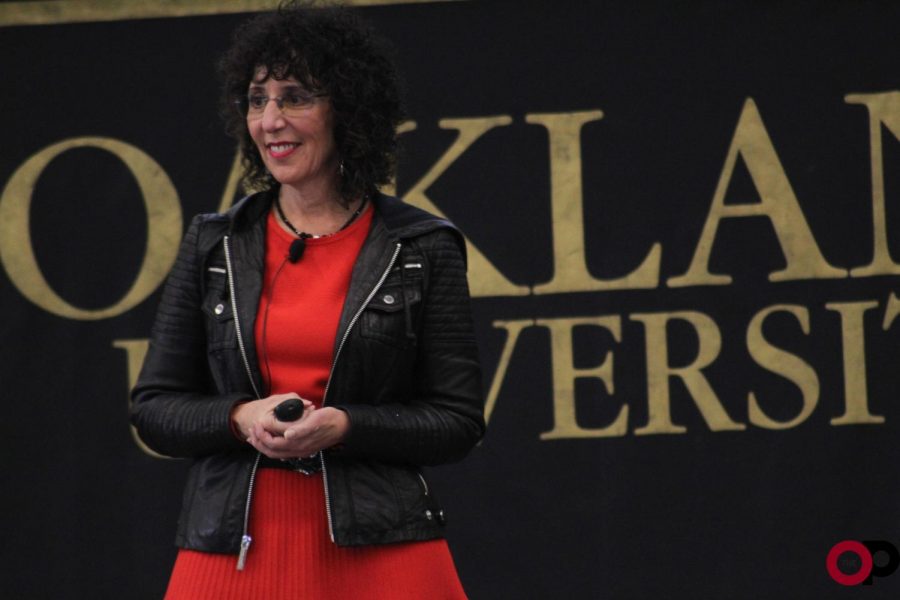‘We Are OU’: 2019 State of the University Address highlights campus efforts
President Ora Hirsch Pescovitz delivers the second annual State of the University Address in the Oakland Center on Tuesday, Oct. 22.
Campus-wide initiatives comprising four strategic goals and a plan to “reimagine” Oakland University were discussed at President Ora Hirsch Pescovitz’s second annual State of the University Address on Tuesday, Oct. 22.
With OU community members rising throughout the event to speak about what makes them part of OU, the address had a full audience of campus supporters.
Student success
Following information reported in the Oct. 14 Board of Trustees meeting, OU’s enrollment has been growing since 2009 along with only five other Michigan public universities, despite the decreasing number of Michigan high school graduates.
First-time in any college (FTIAC) applications and admissions are at all-all time highs, according to Pescovitz, with 14,894 applications and 10,375 admitted students. Initiatives like the Strategic Enrollment Management plan aim toward attracting new students and retaining enrolled students.
With Michigan’s higher education expenditures at only 4.1%, the state is the most tuition dependent in the nation. In the 2019-2020 academic year, OU expects 80% of its revenue will come from tuition alone.
The average OU student loan debt is $25,228, but Pescovitz stresses the importance of seeking higher education.
“Offering accessible and affordable education is among our highest priorities,” Pescovitz said. “Investing in higher education is the best return on investment anyone can make in themselves or their children.”
Research
Pescovitz’s second strategic goal, research, came to be after OU moved up to the R2 designation in the Carnegie Classification of Higher Education in December 2018 — the second highest tier, which is held by only 3.1% of universities in the nation. The new classification can allow researchers to secure external grants and appeal to industry partners.
This year’s annual president’s retreat focused on research. Pescovitz and other OU leaders sought to increase the number of researchers and grants, since OU’s number of principal investigators is down; increase undergraduate and graduate student engagement in research; improve policies and practice; and promote research activity.
Community engagement
According to Pescovitz, the third goal, community engagement, embodies the campus’ efforts to connect to its surroundings.
“Community engagement is both an obligation and an ongoing challenge that requires us to mobilize and utilize our resources to make a positive and impactful difference in our communities,” she said.
OU has built relationships with the Pontiac community in the past five years of the OU-Pontiac Initiative, providing access to healthy foods, educational support and cultural celebrations. OU William Beaumont School of Medicine students took part in a poverty simulation in Pontiac to engage with community members and diversify their experiences.
Diversity, equity and inclusion
Concerning OU’s commitment to diversity, Pescovitz said, “Our goal is to continue to broaden the diversity of our student population, faculty and staff, but our work is far from done.”
Pescovitz aims to increase campus representation of women, minorities and international students and staff; close the achievement gap between majority and minority students; and better communicate diversity policies.
On Sunday, Oct. 27, OU will receive the 2019 American Association of State Colleges and Universities Excellence and Innovation Award for Leadership Development and Diversity at a ceremony in Phoenix, Arizona, for its Leadership Academy program.
Reimagining OU: Vision 2025
Pescovitz said many institutions are making changes to “reshape the higher education landscape.” Challenges are rising, such as enrollment declines, a lack of increase in public funding to universities, people questioning the value of higher education and increasing student debt.
The new plan to address these challenges is “Reimagining OU.” Dr. Kevin Corcoran and Dr. Graeme Harper, supported by an external consultant, will be co-chairs of the Reimagining OU steering committee to review processes and recommend ways to improve university operation.
In positioning OU for continuous improvement, Pescovitz said collaboration makes the university powerful.
“The state of our university depends on our shared realization that when we work together, we are stronger, we have greater impact, we make a difference, and we make Oakland University the university of choice for students, faculty, staff and the community,” Pescovitz said.








